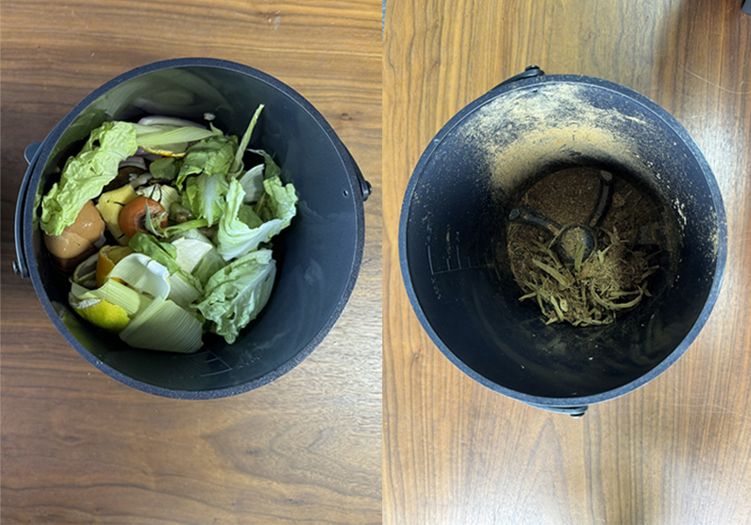National Free Service Email: info@spairobot.com

Get A Quote
How Compost is Made from Kitchen Waste?-The Ultimate Guide.
SPAIR has launched a new product-Smart Waste Kitchen Composter Manufacturer. It can help your translate food waste into compost. I will tell you what is compost and how compost is made from kitchen waste.
What is Compost?
Compost is a blend of organic waste that gradually undergoes a natural breakdown or decomposition process, transforming into nutrient-rich soil. The term "organic" refers to materials that were once alive or derived from living organisms.
Typically, a compost pile comprises a mix of "green" organic elements such as food scraps, garden trimmings, or fresh manure, along with "brown" organic materials like dry leaves, cardboard, and wood chips. The "green" materials contain nitrogen, while the "brown" materials contain carbon.
In conjunction with air and water, these chemicals create optimal living conditions for tiny organisms such as bacteria, molds, worms, and insects. These organisms feed on the organic matter, facilitating the breakdown process.
Composting is a natural aspect of the life cycle, occurring in nature when dead leaves fall in the forest, decomposing and enriching the soil beneath.
Benefits of Composting
Compost serves various valuable purposes. It can be blended into regular soil to enhance the growth of plants, flowers, and crops, providing a cost-free alternative to commercial fertilizers that can be produced at home or in a school environment.
Moreover, composting contributes to the well-being of our planet. Contrasting with composting, when organic waste ends up in landfills, issues arise.
Landfills, vast piles of non-degradable waste, contain a mixture of organic and inorganic materials, including plastic, which does not naturally decompose. This poses environmental problems, releasing methane gas into the atmosphere, contributing to climate change, and creating a risk of fires at landfill sites.
Additionally, the trapped food waste in landfills generates leachate, a toxic black liquid containing harmful chemicals, which can contaminate rivers, lakes, and groundwater.
By composting, we can circumvent these environmental challenges. It offers a straightforward means to combat climate change, ensuring the safety and cleanliness of our water sources and aquatic environments.
Considering that organic materials constitute a substantial portion of household waste, composting also significantly reduces the volume of waste in our bins and minimizes the space needed for landfills.
How Compost is Made from Kitchen Waste?
Selecting the Right Compost Ingredients
The selection of appropriate ingredients is paramount for the efficient functioning of your compost bin. Striking a delicate balance between "green" nitrogen-rich materials like food scraps and yard waste, and "brown" carbon-rich materials such as fallen leaves and old newspapers is crucial.
When appropriately combined in the correct ratio, these materials create an ideal environment for the flourishing of bacteria and worms. They work harmoniously to transform what would otherwise be considered waste into valuable compost. To ensure the health and productivity of your compost pile, adhere to the following list of compostable categories.
It's worth noting that composting guidelines may differ based on your locality, so it's advisable to check with your municipality to confirm acceptable items for composting. Glad® Composting bags are specifically designed for use in municipal composting programs.
Special Considerations
Certain items, although falling into the "green" or "brown" categories, require special attention when considering composting. These items have the potential to disrupt your pile by introducing unwanted fungus, unpleasant odors, and unwelcome critters into your backyard. Given the unique nature of each situation, it's prudent to exclude these items from your pile unless you are adequately prepared for the potential consequences. Exercise caution when incorporating these materials into your compost bin.
Note: The compostability of these items depends on the compost program. Contact your local municipality to learn more before composting.
Regular Turning for Optimal Results
After setting up your bin and filling it with the right ingredients, it's easy to overlook the importance of maintaining the mixture. Similar to other living organisms, compost bacteria require oxygen to thrive. Therefore, turning the mixture approximately once a week is essential. Insufficient ventilation can slow down the bacteria in the middle of the pile, reducing heat production.
A simple indicator of the need for turning is the internal temperature of the compost pile. Once properly aerated, you can harness your compost for various applications.
Conclusion
Composting is both beneficial for environment and farming. SPAIR provide the smart waste kitchen manfacturer will help you accomplish the task.

